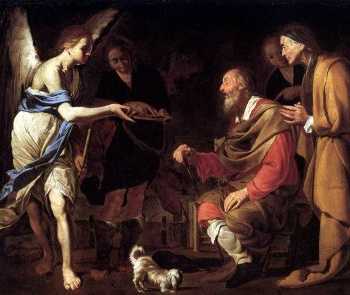 The reading from the book of Tobit and the Gospel of Mark today both speak about how to handle our money with righteousness. This is a difficult topic for a lot of us, because many people struggle just to pay their bills and provide for the basic needs of their families. From time to time many people have unexpected medical bills, a job loss, a car that breaks, or a house needs a new roof, and they really have to watch their money carefully to pay for these extra expenses. It is a virtuous act though, to assume responsibility for our obligations and debts and work to pay for them.
The reading from the book of Tobit and the Gospel of Mark today both speak about how to handle our money with righteousness. This is a difficult topic for a lot of us, because many people struggle just to pay their bills and provide for the basic needs of their families. From time to time many people have unexpected medical bills, a job loss, a car that breaks, or a house needs a new roof, and they really have to watch their money carefully to pay for these extra expenses. It is a virtuous act though, to assume responsibility for our obligations and debts and work to pay for them.
We all know people who are irresponsible with their money and the debts that they incur can become a burden on others. Sometimes though, a person can not pay back a debt through no fault of their own. Then, there are people who have lived very poor and did without things they needed, and when they were doing better financially, they save every bit of money they can for fear of not having it again.
It is important to look at how we manage our money in general though, because our natural instincts are to live as well as we can. Almost no one wants to live in a cheaper home, drive an old car or ride the bus, wear second hand clothes and eat the cheapest foods available. Beans and rice can get a little old after a while. So, our natural instincts are to enjoy life a little more than just the basic necessities. After all, what do you work for? Just the bare necessities? And therein lies the problem. As we pursue a better quality of life it often means that there is very little discretionary money in our budget. Tobit in the first reading today did not have that problem though, because he told his son to give half of the money they brought back to Raphael. Tobit lived beneath his means, so he had a little extra money that he could give to Raphael in gratitude for his service. Actually, Tobit was verygenerous because he told Tobias to give him an extra bonus as well.
No matter how much money we have, it is still possible to live above our means, and then we will have very little, if anything, to give to others who are in need. After the angel Raphael disclosed who he really was, he told Tobias, “Prayer with fasting is good, but better than both is almsgiving with righteousness.” And that, “It is better to give alms than to lay up gold. For almsgiving saves from death and purges away every sin. Those who give alms will enjoy a full life, but those who commit sin and do wrong are their own worst enemies.”
The “full life” that the angel Raphael spoke about is actually a paradox. When we do things for others, it seems like we have less for ourselves. However, after a while we can find joy in giving to others. Like Saint Francis once said, “It is in giving that we receive” and he was so right. Those who can not seem to give of themselves, financially, emotionally, or physically end up lonely and “become their own worst enemy” just like the angel Raphael said.
A lot of Catholics study investments and money management in order to “lay up gold” for their old age. It is a good thing to plan for our old age, but we need to be very careful to not get overly caught up in this mindset, because it is in giving away our money to people in need, that the Lord Jesus values. How much money we have accumulated in the bank when we die will not matter to God, but we will be judged on how we used our money during our life. Jesus repeatedly warned his followers about the proper use of money: “Sell your belongings and give alms. Provide money bags for yourselves that do not wear out, an inexhaustible treasure in heaven that no thief can reach nor moth destroy. For where your treasure is, there also will your heart be.”
And that brings us to today’s Gospel. Jesus frowned upon the people in the community that acquired wealth the wrong way and then wore expensive clothes and wanted to be well respected as prominent members of the community. They wanted to appear very religious, but they in fact were not.
What touched Jesus’ heart though, was a poor widow. She contributed all she had to live on, to the treasury. What a very hard thing this would be for us to do. It is no wonder that Jesus noticed her small gift. She gave all that she had to God. Are there any of us who are reading these words today, that could do what the poor widow did? Give ALL of our grocery money to God? It’s something we would do well to think about today. How much of our life actually reflects the poor widow? Perhaps there are small changes we could make toward managing our money more according to what the Lord Jesus values, rather than what our world values.
